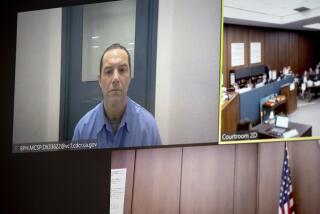Judge OKs Genetic Fingerprinting Use
- Share via
VENTURA — A Ventura County Superior Court judge Monday ruled for the first time in a California court that so-called genetic fingerprinting is admissible as evidence in a criminal trial.
The ruling by Judge Lawrence Storch had been awaited by prosecutors to clear the way for use of the new tool in obtaining convictions. The technique, which matches the genetic makeup of a suspect with tissue samples found at a crime scene, was developed four years ago in Great Britain and is already admissible as evidence in 18 other U.S. states.
While defense attorneys can still contest the use of genetic matching, the Ventura ruling is expected to be cited by prosecutors throughout the state in arguing that the procedure is now admissible evidence, Ventura prosecutors said.
Los Angeles County Dist. Atty. Ira Reiner and state Atty. Gen. John K. Van de Kamp have already used testimony from the five-month hearing before Storch in preparing criminal cases, said Carol Nelson, the senior deputy district attorney who is prosecuting the Ventura County case.
Storch, who heard technical testimony from 11 experts, including molecular biologists from Yale and Stanford universities, called the arguments in favor of genetic, or DNA, typing “very compelling.”
“The bottom line in this type of technique is whether there’s a risk of pointing the finger at the wrong person or exculpating the guilty, and I conclude . . . that the risk is slim to none,” Storch said.
Nelson said that, with the judge’s “significant” ruling, testimony from genetics experts can be used to establish links between suspects and crimes. The Ventura County district attorney’s office spent 18 months preparing the admissibility of DNA in order to make it unassailable on appeal, she said.
“Now you’ve really had it tested,” Nelson said after the hearing. “Other cases didn’t stand up on appeal because both sides didn’t get their best shots . . . but Ventura County has made an outstanding effort to let us put on all the evidence that is available.”
One of the two defense attorneys, Willard P. Wiksell, argued that the experts called by Nelson were biased because they worked for the company that tested the DNA samples and stood to gain “millions of dollars” if its tests were accepted by California courts.
The DNA ruling came in the early stages of the murder trial of Lynda Axell, 33, of Ventura, who is charged with stabbing George White, 63, to death during a robbery attempt last year at a local hamburger stand.
Storch ordered the non-jury hearing last March to determine whether to allow the DNA test results obtained from strands of hair.
During the extensive hearing, a Harvard University-trained biologist testified that the DNA patterns from hair belonging to Axell matched “identically” with the DNA patterns from 15 hairs found at Top Hat Burger, where White was found dead.
DNA stands for deoxyribonucleic acid and is found in the cells of human tissue, such as blood, hair roots or semen. Scientists say they can translate the genetic makeup of tissue into DNA patterns and make perfect matches between the tissue and individuals.
More to Read
Sign up for Essential California
The most important California stories and recommendations in your inbox every morning.
You may occasionally receive promotional content from the Los Angeles Times.










